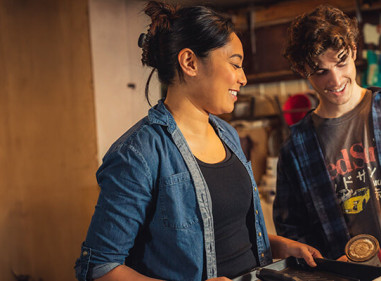
Planning & budgeting
Saving & investing
KiwiSaver
Tackling debt
Protecting wealth
Retirement
Home buying
Life events
Setting goals
Money tracking
Plan your spending with a budget
Getting advice
Studying
Get better with money
What pūtea beliefs do you have?
How to build up your emergency savings to cover unexpected costs
How to save your money
How to start investing
Find a financial adviser to help you invest
Your investment profile
Compound interest
Net worth
Types of investments
Term deposits
Bonds
Investment funds
Shares
Property investment
How KiwiSaver works and why it's worth joining
How to pick the right KiwiSaver fund
Make the most of KiwiSaver and grow your balance
How KiwiSaver can help you get into your first home
Applying for a KiwiSaver hardship withdrawal
How to use buy now pay later
What you really need to know before you use credit
How to get out of debt quickly
Credit reports
Know your rights
Pros and cons of debt consolidation
Credit cards
Car loans
Personal loans
Hire purchase
Student loans
Getting a fine
What happens if I start to struggle with moni?
How to build up your emergency savings to cover unexpected costs
Cryptocurrency
How to protect yourself from fraud and being scammed
About insurance
Insurance types
Insuring ourselves
Wills
Enduring powers of attorney
Family trusts
Insuring our homes
Losing a partner
Redundancy
Serious diagnosis
How to cope with the aftermath of fraud
Separation
About NZ Super – how much is it?
When you’re thinking of living in a retirement village
How to plan, save and invest for retirement
Manage your money in retirement
Find housing options in retirement
Four approaches to spending in retirement
Planning & budgeting
Saving & investing
How to build up your emergency savings to cover unexpected costs
How to save your money
How to start investing
Find a financial adviser to help you invest
Your investment profile
Compound interest
Net worth
Types of investments
Term deposits
Bonds
Investment funds
Shares
Property investment
View all
KiwiSaver
Tackling debt
How to use buy now pay later
What you really need to know before you use credit
How to get out of debt quickly
Credit reports
Know your rights
Pros and cons of debt consolidation
Credit cards
Car loans
Personal loans
Hire purchase
Student loans
Getting a fine
What happens if I start to struggle with moni?
View all
Protecting wealth
How to build up your emergency savings to cover unexpected costs
Cryptocurrency
How to protect yourself from fraud and being scammed
About insurance
Insurance types
Insuring ourselves
Wills
Enduring powers of attorney
Family trusts
Insuring our homes
Losing a partner
Redundancy
Serious diagnosis
How to cope with the aftermath of fraud
Separation
View all
Retirement
Home buying
Reading time: 4 minutes

When is a bank account the right place for your money?
Savings accounts and term deposits with a bank, credit union or building society are convenient for saving.
They’re relatively safe places to park our money and earn interest, and they are easy to manage and access. Bank accounts and term deposits are a great place for short-term savings, emergency funds, and managing your budget.
Returns on bank deposits aren’t as high as other types of investments, so while they're great for managing the day to day, they're not as powerful for long-term goals.
Whether we choose a savings account or term deposit will depend on how quickly we need the money. Good questions to ask are: ‘Would I need it if I lost my job?' Or 'Are the savings for short-term spending such as holidays?’
Most basic savings accounts allow us to withdraw our money whenever we want. But if we don’t need the money straight away, we could get a higher interest rate from a term deposit.
Bank deposits usually earn interest. That means for every dollar we save, we earn a few cents each year in interest. Interest may be paid daily, monthly or yearly, but is usually quoted as an annual figure such as 2% or 4%.
Most savings accounts offer a straightforward interest rate. Bonus saver accounts are different because they offer a low basic rate and a ‘bonus’ interest rate if we meet certain criteria, such as not withdrawing our money.
Banks offer different interest rates on deposit accounts, and it’s worth shopping around to find the best rate.
You can find current rates on MoneyHub or interest.co.nz.
Bank deposits are good for regular interest payments, or access to money at short notice. However, tax and inflation can eat into the value of the interest earned.
If you want the money you invest to grow further, and can cope with a higher level of risk, consider other investments such as shares, managed funds and property. Here's a guide to different kinds of investments.
If a savings account or term deposit is a PIE (Portfolio Investment Entity), you will pay a lower rate of tax on the interest you earn. There is usually a minimum deposit and other criteria for investing in these types of accounts.
Bank deposits are some of the safest investments available to New Zealanders, but no one can entirely guarantee that a bank or financial institution won’t fail.
In the unlikely event that they do, the Depositor Compensation Scheme (which is administered by the Reserve Bank) protects your money up to $100,000 per institution. That covers money in transaction accounts, savings accounts and term deposits, but not every financial product. You can check your bank or financial institution’s website to see what’s covered, or here’s a list of institutions with links as well.
For amounts over $100,000, you may want to spread the money across several institutions. To learn more about the Depositor Compensation Scheme and how it works, see the Reserve Bank's website.
The Reserve Bank also keeps an eye on how each bank is doing and requires them to publish their credit rating. This acts as a rough guide as to the likely risk of the bank failing.
Sorted’s investor profiler can help you work out a mix of investments (including bank deposits) in order to reach your goals, based on what type of investor you are (your ‘investor profile’).
Guide
Lots of New Zealanders own rental property – it has been a popular form of investment over the years. The…

Guide
At Sorted, we’re keen to see you getting ahead financially and growing your money for the long term. Now generally,…

Guide
Not just anyone can call themselves a financial adviser. They have to meet a certain standard of competence and put…

Guide
When we buy a bond, we’re lending money to a government, council or company.

Guide
Instead of investing directly and doing it all ourselves, we can invest in a managed fund where our money is…

Guide
Investing is the best way to grow wealth and get our money working for us – but how? There are…

Guide
Einstein called it the ‘eighth wonder of the world’. He was talking about compound interest, which supercharges our savings and…

Guide
Investing is all about buying things that put money back into our pockets. Sound intimidating? It’s really not. Those of…

Guide
One of the best habits we can get into is “paying ourselves first” and making it automatic. The more we…

Guide
Everyone needs an emergency fund. When things go pear-shaped, we need to cover ourselves and those we’re closest to. That’s…

Use verification code from your authenticator app. How to use authenticator apps.
Code is invalid. Please try again
Don't have an account? Sign up
Or log in with our social media platforms


A free account gives you your very own space where you can save your tools and track your progress as you get ahead.
Or sign up using Google:


